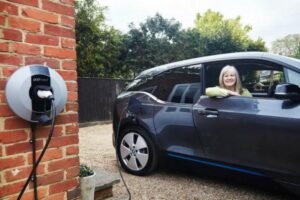Index
- · What are electric vehicle car chargers?
- · How much is it to install an electric vehicle charging point at home?
- · How does an electric vehicle car charger work?
- · What are the benefits of an electric vehicle charger at home?
- · Are there any disadvantages to an Electric vehicle charging point?
- · What are the different types of electric vehicle charging points?
- · Where can you install a charging point?
- · Best location to install an electric vehicle charging point?
- · Can I install an electric vehicle charger if I live in an apartment?
- · Are there any electric vehicle charger installers in Malaga?
- · Can you use an electric vehicle charger with Solar PV panels?
- · How do Solar PV panels work?
- How do Solar PV panels systems work?
- · What are Solar PV panels made from?
- · Can you save money with Solar PV panels and an electric car charger?
- · Can I get a government grant for Solar PV panels or an electric car charger in Spain?
A Guide to Home Electric Car Charger Installation in Malaga
Do you currently own or are thing about buying an Electric Car or another Electric Vehicle? Yes, then this article will hopefully answer some questions you have about charging an electric car or zero-emission vehicle.
Electric cars and zero-emission vehicles are the future, and petrol and diesel cars, are the past, but, the current worry is the charging point infrastructure. This is why having a home Electric Car charger installed, will release a lot of the stress from owning an electric car.
An Electric car charger installed on your home or promises will add value and well as convenience. The last thing you want to be thinking about when you’re at home after a long day of work is charging an electric car or charging at home..
Home EV charging point installation is an important step in transitioning to an electric vehicle lifestyle. The home charger station for your EV provides you with the convenience of recharging your vehicle when convenient and can be a great way to save money on electricity costs if used correctly.
However, it’s important to understand the different types of home car chargers that are available and the requirements for the charge point installation before making any commitments.
There are three main categories of home EV chargers:
Level 1 Electric Vehicle Charger.
 Level 1 chargers use a standard 120v outlet and are designed to slowly charge most Electric Cars overnight or during extended periods when plugged in at home.
Level 1 chargers use a standard 120v outlet and are designed to slowly charge most Electric Cars overnight or during extended periods when plugged in at home.
This type of charger requires very little effort to install but is not the most efficient option for fast charging. This comes with an option of a smart charger, which comes with a phone app.
Level 1 Electric Vehicle Charger.
Level 2 chargers, which require a dedicated 240v outlet, are much faster and often used in commercial properties or public locations where electric car owners need to charge diesel car quickly. This comes with an option of a smart charger, which comes with a phone app.
DC Level 1 Electric Vehicle Charger Fast Charger.
DC fast chargers are the fastest way to refuel an electric vehicle and can provide up to 80% of a full charge in just 30 minutes. However, they require more effort to install than Level 1 or Level 2 chargers due to their higher requirements for electricity supply and safety features.
 It’s important to hire a qualified electrician who is familiar with home electric cars charger installation when considering this type of charger. This comes with an option of a smart charger, which comes with a mobile phone app.
It’s important to hire a qualified electrician who is familiar with home electric cars charger installation when considering this type of charger. This comes with an option of a smart charger, which comes with a mobile phone app.
What are electric vehicle car chargers?
Electric vehicle (EV) car chargers are becoming increasingly popular as the demand for electric vehicles rises. Home EV charging points allow drivers to charge their electric vehicles without needing to visit dedicated public charge or electric car charging points first.
The process of home EV charger installation can vary depending on the type of charger and what is available in your area.
Two main types of chargers can be used in a residential setting: hardwired or plug-in. Hardwired chargers require professional installation, while plug-in chargers are easier to install and can typically be done by an experienced handyman or homeowner.
Plug-in chargers tend to be less expensive than hardwired units and offer many of the same benefits, but they come with some limitations such as the need to move them if you change locations.
There are a variety of other types of chargers available, such as induction chargers and wireless chargers. Induction chargers offer faster charging times than plug-in or hardwired models, but they require special installation and can be more expensive.
Wireless chargers provide an inexpensive way to charge electric vehicles without having to plug it in, but they may have lower power ratings than a traditional electric cars chargers.
How much is it to install an electric vehicle charging point at home?
The cost of installing a home electric vehicle (EV) charger can vary widely depending on the type and features you choose. A home charger typically ranges in price from around 350€-1100€, with installation costs ranging from 150€-£650€.
For most people, an entry-level 3kW charger will be sufficient for their needs. These are usually priced around 200€-450€ and may require additional electrical work to install safely at your property.
Most domestic properties should expect to pay between 150€-£250€ for an electrician to carry out any additional work required for the installation such as adding or upgrading circuit breakers etc.
If you are looking for faster charging times, you may want to consider a 7kW charger. These are more expensive, but they will provide faster charging speeds and are useful for those who drive longer distances or prefer to charge their vehicles quicker.
Prices for these types of chargers usually range from 650€-1100€ with installation costs of approximately 200€-400€ depending on the work required.
It is important to remember that if your property does not have an existing outside electrical power supply, additional work may be necessary to install a home electric car charging point.
If you need advice on what type of charger is right for you or how much to expect it to cost, contact a qualified installer as they can guide you through all three phase supply the process and provide accurate quotes based on your specific needs.
How does an electric vehicle car charger work?
When it comes to powering an electric vehicle (EV) at home, the most convenient and cost-effective way of doing so is by installing a home EV charger.
Home charging points are designed specifically for this purpose and provide a safer, faster way of charging cable recharging an electric cars battery than plugging it into a regular household socket.
There are many different types of home EV chargers available on the market today, each offering varying levels of power output, charging speed and installation requirements.
Depending on your needs and budget, you can choose from a level 1 car charger which works with standard 120V wall outlets to a level 3 DC fast charger that allow for rapid energy transfer from an external source such as PV panels or utility grids.
If you’re looking to install a home electric car charger, it’s important to consider the installation process and the legal requirements associated with it.
 Depending on the type of EV charger you choose, you may need to hire a certified electrician who is familiar with local building codes and permits. Furthermore, different chargers will have different power requirements and could require an upgrade to your current electrical system for proper operation.
Depending on the type of EV charger you choose, you may need to hire a certified electrician who is familiar with local building codes and permits. Furthermore, different chargers will have different power requirements and could require an upgrade to your current electrical system for proper operation.
Once you’ve chosen the right home electric car charger for your needs and gone through the necessary steps for installation, you can enjoy fast and safe charging from the comfort of your own home.
What are the benefits of an electric vehicle charger at home?
At home, having an Electric Car charger installed is a convenient and affordable way to charge your EV. Home EV chargers are easy to install and provide access to charging power for electric car at home any time of the day or night.
With a home charger, you can enjoy the convenience of keeping your electric car at home fully charged up, for whenever you need it.
There are a few different types of home EV chargers that you can choose from, depending on your needs and budget. Level 1 chargers use standard 120-volt electrical outlets, while Level 2 chargers require 240 volts, like those found in large appliances.
These faster charging options may be more expensive upfront but offer much faster charging times – ideal if you need to get back on the road quickly.
Installing a home electric car charger is an excellent way to get the most out of your electric vehicle. Not only do you benefit from the convenience of being able to just charge an electric car at any time, but you also stand to save money in the long run, since charging up at home is much more cost-effective than relying on public charging stations.
Home EV chargers come with several safety features and warranties that ensure your car stays safe while it charges.
Are there any disadvantages to an Electric vehicle charging point?
Electric vehicle charging points come with several advantages such as reducing fuel costs and emissions, however, there are some potential drawbacks too.
Home Electric vehicle charger installation can be costly depending on the complexity of the setup – they could involve running new cabling and upgrading electrical panels to support the increased load (although this will also depend on your existing home wiring).
You may need to obtain permission from local municipalities or HOA’s if special approvals are required for any work done externally. It’s important to check these requirements before commencing installation.
approvals are required for any work done externally. It’s important to check these requirements before commencing installation.
Similarly, installing an electric vehicle charging point in your workplace could require additional infrastructure installations like new wiring, power outlets and dedicated parking spaces which all have their
What are the different types of electric vehicle charging points?
When it comes to home electric car chargers and vehicle charging, there are many different types of chargers available. Home electric vehicle charger installation can be a convenient way to charge your car in the comfort of your own home.
The most common type of home EV charging point is the Level 1 charger. This type of charger uses a standard three-prong wall outlet and works with all plug-in hybrid and battery EVs.
Level 1 chargers are usually low-powered (1.2kW – 3kW) and they take longer to recharge an EV compared to other types of chargers.
Level 2 chargers are more powerful than level 1 and are rapid chargers and generally require professional installation due to their higher voltage requirements (208V or 240V). These chargers can provide up to 7kW of power, resulting in faster charging times.
DC fast chargers are the most powerful type of electric car charger and are capable of delivering up to 90kW of power.
Most electric vehicles now come with a charging unit with a built-in connector which allows for direct connection from the charging unit to DC fast chargers. This makes them perfect for long-distance travel as they can charge an EV from empty to full in under 30 minutes.
It’s important to understand all the different options available before making any purchase decisions. Professional installation is often recommended for safety reasons and may be required depending on local regulations or your home’s electrical setup.
Where can you install a charging point?
Charging an electric vehicle (EV) at home is a great way to save time and money. Home EV chargers are designed for easy installation, allowing you to charge your vehicles quickly and conveniently.
Depending on the type of charger installed in your home, it may be possible to install one or more charging points.
You can install a smart charging point in a variety of locations around your house including garages, driveways, walls or even inside your residence. Generally speaking, having a dedicated off-street parking space with access to power is ideal for installing an EV charger.
However, there are plenty of other options smart charge points available if this isn’t possible.
There are several types of home charger for electric car charging that are suitable for different households and locations. The most basic charger is a 3-pin plug, which can be plugged into any standard household socket and used to charge your vehicle at a slower rate than the other types of home chargers.
However, this type of charger is suitable only for slow trickle charging over long periods.
 More powerful EV chargers are available in two varieties: AC and DC. AC chargers tend to be cheaper and more commonly installed in homes, as they convert power from the mains electricity supply into energy suitable for charging EVs. DC chargers are typically more expensive and require dedicated power sources for installation.
More powerful EV chargers are available in two varieties: AC and DC. AC chargers tend to be cheaper and more commonly installed in homes, as they convert power from the mains electricity supply into energy suitable for charging EVs. DC chargers are typically more expensive and require dedicated power sources for installation.
They offer significantly faster charging speeds than AC chargers but may need additional cutting-edge equipment such as inverters or transformers depending on their location.
Best location to install an electric vehicle charging point?
When installing an electric vehicle (EV) charger at home, there are several factors to consider before making the final decision. The location of the charging point should be selected based on the type of EV that you drive, how much electricity is available in your area and any other restrictions or regulations for installation.
It’s important to know which type of EV charger will best suit your needs – wall-mounted or floor-mounted. A wall-mounted EV charger offers convenience and flexibility when it comes to being able to move around in a parking garage or carport without needing to access additional tools or equipment.
Floor-mounted chargers offer more stability as they can be bolted directly into the ground and require less maintenance throughout their lifespan.
When it comes to the amount of electricity available in your area, you will need to make sure that there is enough power available for the charger to work properly and meet your needs.
Depending on the model and size of your EV, you may require an additional box or panel system installed alongside the charging point itself. It’s also important to check any local regulations or restrictions regarding where electric vehicle chargers can be installed.
Find a location with own charging cable that offers convenience as well as meets any local regulations, and always ensure that there is enough electricity available for proper use of the charging.
Can I install an electric vehicle charger if I live in an apartment?
Yes, it is possible to install an electric vehicle charger if you live in an apartment, as long as you have an allocated carport, next to the building or underground car park and there is easy access to mains power.
Depending on the type of charging station and the power supply available for smart car charging at home that is, there are a very few cars different types of home EV chargers that can be installed.
Level 1 (110V) chargers are typically used in private residential settings and require the least amount of work to install.
Level 2 (220-240V) chargers are more commonly used for public charging stations and require some additional wiring to be completed before installation. Additionally, DC fast chargers (400-800V), which are designed for commercial applications, require more complex installation procedures due to their higher power requirements.
No matter what type of home EV charger you’re looking to install, it’s important to consult an electrician or a certified installer before starting the project.
This will ensure that the installation is done safely and correctly, and help you make sure that your home meets all of the necessary criteria for safe and efficient charging.
Additionally, local utility companies may have rules and regulations regarding EV charging units, tethered charger installations and smart chargers, that must be followed before you can begin work on your project.
Are there any electric vehicle charger installers in Malaga?
Yes, there is electric vehicle tethered charger installers in Malaga. Home EV charging points are becoming increasingly popular among many EV drivers and owners, as they can provide fast and efficient charging of the vehicle battery at home.
There are many different types of home EV chargers available to suit different needs and requirements. These range from basic wall-mounted units to smart chargers with advanced features such as timed smart charging features, remote monitoring, smart charging features and energy management capabilities.
To ensure the safe installation of a home EV charger, it is best to work with a qualified EV charger installer who is familiar with local regulations and standards. In Malaga, several experienced installers specialize in the installation of EV chargers for both residential and commercial use.
These installers can provide advice on the best charger for your particular needs, as well as assistance with installation and ongoing maintenance of the charger. They can also answer any questions you may have about using an EV charger at home.
By working with a qualified smart charger installer in Malaga, you can be sure that your home EV charging station is installed correctly, safely and according to local regulations. This will ensure maximum efficiency when it comes to charging your electric vehicle at home.
Can you use an electric vehicle charger with Solar PV panels?
Yes, it is possible to use an electric vehicle (EV) charger with PV panels. Installing a home EV charging point can help reduce emissions from transportation and make charging your EV more convenient.
Home EV chargers come in different types that vary depending on their power output and how they are connected to the electricity grid.
Chargers which are powered by solar panels typically have a lower power rating than those directly connected to the electricity grid. This makes them suitable for slower off-peak charging, allowing you to take advantage of cheaper energy tariffs available overnight or during weekends.
In some cases, installing a combination of PV panels and grid-connected chargers may be the most cost-effective solution as it will allow you to charge your EV at a faster rate from the national grid when available, while also taking advantage of renewable energy solutions from Solares Energies
Whether you choose to install a home EV charger powered solely by PV panels or combined with a mains connection, it is important to take into consideration your local utility regulations and existing infrastructure.
A qualified electrician should be consulted before installation to ensure that all necessary safety precautions are taken.
Using PV panels to charge EV’s can be an environmentally-friendly and cost-effective choice for charging at home. However, it is important to consider the type of charger needed and any local infrastructure before making a decision.
Consulting an experienced electrician will help ensure that all safety measures are followed and your EV charging point is installed correctly.
How do Solar PV panels work?
Solar panel systems are a great way to generate electricity for your home, and they can also be used to power an electric vehicle (EV) charger. Solar panels work by collecting the energy from sunlight and converting it into usable electricity.
This electricity can then be used to charge your EV battery or provide power for a home electric vehicle charging point. The amount of power generated is determined by the size of the solar panel system, as well as its location and position relative to the sun.
Depending on how much energy you need, there are different types of solar panel systems that you can install in your home, ranging from small rooftop installations to large ground-mounted arrays.
When installing a smart charger at home, it’s important to consider how much electricity you need, where the charger will be located, and what type of charger is best for your needs. Home EV chargers typically come in three different types: Level 1, Level 2, and DC Fast Charging.
Level 1 chargers are the slowest but most affordable option; they require a 120-volt outlet and can take up to 8 hours to fully charge an EV battery. Level 2 chargers use a 240-volt outlet and can charge an EV battery twice as fast as Level 1 chargers; these are usually the most popular option for most home charging installations.
Finally, DC Fast Chargers offer the fastest charging speeds—up to 80% in 30 minutes—but they require specialized equipment that makes them more expensive than other options.
How do Solar PV panels work?
Solar panel systems convert the sun’s energy into usable electricity, which can be utilized to power your home, business or other facilities. A solar system is composed of various components: photovoltaic (PV) cells, an inverter and a battery.
PV cells are the actual panels that collect energy from the sun. The inverter then converts direct current (DC) from the PV cell into alternating current (AC), which powers most home appliances. PV panels with battery storage allow homeowners to store excess energy in batteries for later use when the sun isn’t shining. Battery-backed solar systems also provide an uninterrupted power supply if there is a power outage or utility grid failure.
This allows for increased energy efficiency as it increases your ability to balance energy use, maximizing the amount of solar energy you can use. Ultimately, using PV panels is an effective way to reduce your energy bills and carbon footprint while helping create a more sustainable future for our planet.
What are Solar PV panels made from?
Solar panels are typically composed of solar cells, each composed of silicon layers. These cells convert sunlight into electricity through a process called the photovoltaic effect. The more cells a panel has, the higher its power output and efficiency.
Solar panel systems come in many different sizes and configurations depending on their intended use and desired output levels. The most common type is an array of modules that generate direct current (DC) power which can be used to run appliances or charge batteries for later use.
Larger arrays are used to generate alternating current (AC) power which can then be fed into the electrical grid or stored in solar battery banks for later use. Many PV panels also include features like tracking devices that help optimize energy production throughout the day by automatically adjusting the orientation of the panels to follow the sun’s path.
PV panels with battery storage are becoming more popular as it allows for energy to be stored for later use if needed. This is especially useful in areas where electricity access is limited or sporadic. With advances in solar technology, solar panel systems are becoming cheaper and more efficient; making them a viable option for many households and businesses around the world.
Can you save money with Solar PV panels and an electric car charger?
The answer is yes! Solar panel systems and electric vehicle chargers can offer great savings on your monthly energy bill. PV panels convert the sun’s rays into electricity, while an EV charger draws energy from the grid to power up your electric vehicle.
By installing PV panels and an EV charger in your home or business, you will be able to reduce your electricity costs as well as enjoy other benefits such as reduced emissions and increased property value. Solar panel system installation and EV charger setup can be accomplished easily, making it a cost-effective way to save money on your energy bills while helping protect the environment.
PV panels and an EV charger can be a great investment for any homeowner or business looking to save money on energy bills while doing their part to help the environment. Start saving today by installing PV panels and an EV charger!
Can I get a government grant for Solar PV panels or an electric car charger in Spain?
The answer is yes. The Spanish government provides financial incentives to install Solar Panel systems and Electric Vehicle Chargers in Spain. Depending on your location, you may be eligible for different types of grant money or other forms of support. To find out more information about grants and other incentives available to install Solar Panel systems and Electric Vehicle Chargers in Spain, please contact your local energy provider or the Ministry of Industry, Energy and Tourism (MINCETUR).
In addition to government grants, several private companies offer Solar Panel Systems or Electric Vehicle Chargers at discounted prices. Be sure to compare all options before investing in PV panels or an EV Charger System in Spain.
If you decide to install PV panels or an EV Charger System in Spain, be sure to research local laws and regulations as PV panels or Electric Vehicle Chargers may not be allowed in certain areas. Additionally, you should consider the environmental impact of Solar Panel Systems and Electric Vehicle Chargers before investing.
Installing PV panels and an Electric Vehicle Charger in Spain is a great way to save money on electricity bills and reduce your carbon footprint. It is possible to get a government grant for Solar Panel systems or an EV charger in Spain as long as you meet the requirements set out by the Ministry of Industry, Energy and Tourism (MINCETUR).
Be sure to do your research and compare all options before investing in PV panels or an EV Charger System in Spain. Contact us today and ask about the electric vehicle home charge scheme.
If you have an electric car at home and you’re interested in EV smart chargers, or any of the other renewable energy products available, then contact the team at Solares Energies (SolaresEnergies.com).



 Solar Panel Products & Articles
Solar Panel Products & Articles Other Products & Services
Other Products & Services



